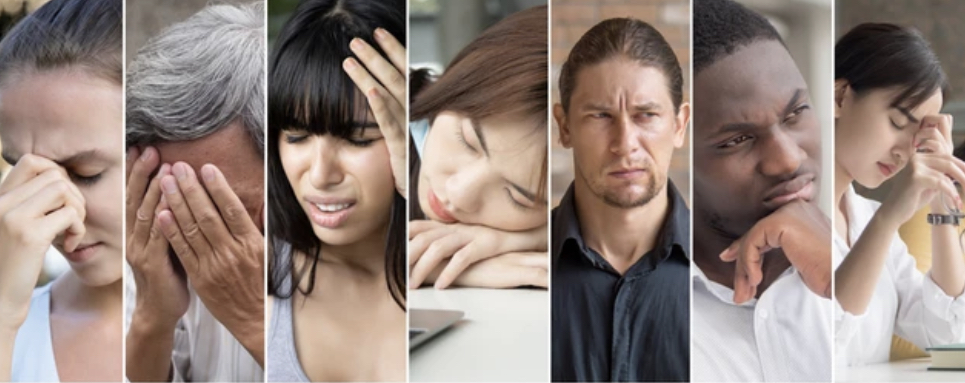Depression can feel lonely, but you’re not alone.
Depression can be scary, in part because it can make you feel so alone. While everyone can get down or feel sad during certain points in life, a depressed individual may have a hard time moving beyond those feelings. With feelings of relentless despair, overwhelming hopelessness and lack of interest in things that once brought you joy, it’s easy to feel trapped in a dark place. Thankfully, you are not alone with your depression. MySpectrum offers both in-person and virtual depression therapy in Virginia.
MySpectrum offers therapy throughout the state of Virginia, no matter where you may live. You have access to our compassionate, therapeutic services either in-person or via one of our teletherapy options. Whether you live near our North Chesterfield home office, in Northern Virginia or close to our opening-soon office in Springfield, you can get compassionate, professional counseling for depression and anxiety. Therapy online is an added benefit for those days when you just don’t have it in you to travel to an office.
Therapy That Reaches Every Spectrum of Depression
Depression is a diverse emotional health condition. Numerous types of depression exist, including (but not limited to):
- Major Depression
- Persistent Depressive Disorder
- Bipolar Disorder (Manic Depression)
- Cyclothymia
- Seasonal Affective Disorder (SAD)
- Perinatal/Post-Partum Depression
- Psychotic Depression
- Premenstrual Dysphoric Disorder (PMDD)
- Atypical Depression
- Dysthymia
While there are a number of types of depression, the most prevalent are Major Depressive Disorder, Persistent Depressive Disorder (PDD), and Seasonal Affective Disorder. Aside from a diagnosis, depression might be an adjustment in your mood or how you’re feeling to the point that everyday life just doesn’t feel right, worthwhile, or fun anymore. It is important to not get too caught up on a diagnosis because the bottom line is that if you’re not feeling well mentally, just like with physical health, seeking help is key to get on a path to wellness. It is also possible that you are experiencing a combination of “diagnoses” and our trained therapists can help you sort it all out.
Common Signs and Symptoms of Depression
Although there are different types of depression, many have similar symptoms. Two of the most common symptoms of depression are feelings of despair and general loss of interest in life. Other signs include:
- A depressed state, feeling sad or hopeless
- No (or little) interest in activities you once enjoyed
- Bodily discomforts without an identifiable cause
- Agitation or feeling irritable
- Lack of concentration
- Fatigue, problems sleeping or sleeping too much
- Thoughts of low self-worth or self-loathing
- Suicidal ideas or thoughts
- Weight loss or weight gain
If you have faced similar symptoms, seeking online depression therapy may be an important step to take.
Depression Is More Than Sadness
Everyone experiences feelings of sadness at one time or another, and they can overwhelm anyone. However, it’s important to understand that feeling sad and suffering from depression are not one and the same. The key differences are in the duration and the depth of the feelings you experience. For example, it’s natural to feel sad over a significant loss in your life such as the end of a relationship or the death of someone close to you.
Although such grief certainly can feel like depression, it typically does not result in the long-term feelings of worthlessness and despair that characterize clinical depression. If your sadness is accompanied by feelings of self-loathing or a loss of interest in your life that goes on for an extended period, it could indicate that you’re suffering from depression.
Risk Factors for Depression
Instances of depression can be linked to genetic, biological and even environmental factors. Therefore, a number of depression risk factors exist. You may be more prone to depression if:
- You take certain medications
- You have a personal or familial history of depression
- You have experienced trauma, excessive stress or a life-altering event
- You have certain medical conditions, such as a chronic illness
Sometimes, understanding your risk factors can be important to managing your symptoms. Therefore, if you recognize symptoms and risk factors in yourself, these are both topics to discuss during depression counseling.
How Treatment Can Change Your Life
Depression treatment can take many forms, and those receiving care for this condition may use a combination to address their needs in the most effective manner. The most common treatments are medication, therapy and behavioral changes. Medications can be very effective for many people suffering from depression because it addresses aspects of the disease caused by brain chemistry. Antidepressants serve to re-balance an individual’s brain chemistry to alleviate mood disorders and provide relief. At MySpectrum, we do offer telemedicine combined with depression therapy. Access to our psychiatric medical provider requires a referral from a primary Therapist, so be sure to address your thoughts about medication with your MySpectrum Therapist to see if a referral is the right choice for you.
Many patients experience positive outcomes by learning coping strategies that effectively re-train their thought processes. They learn to identify patterns of thinking that contribute to negative feelings and ways to halt or reverse them.
Therapy may be used on its own in mild cases or in conjunction with medication for those with more-serious mental health concerns. By talking to a licensed therapist who provides depression counseling on a regular basis, patients gain insight into their conditions, learn how to improve their day-to-day experiences, and receive guidance on how they can live happier lives.
If you make the decision to seek depression therapy in Virginia with MySpectrum, you will be given access to trained professionals who understand the complexities of this condition. Through in-person or virtual depression therapy, you can determine some of the underlying factors that could be spurring your symptoms. Most importantly, you will learn new ways to cope with those symptoms to get back to your life.
MySpectrum tailors care to clients with personalized therapy and coaching plans. We strive to be mindful of you as a person, your background and your beliefs. We make finding compassionate therapy as simple as possible with virtual and in-office options.
The best treatment for depression should energize your life, invigorate your outlook and remove anxiety about mental health stigma. Contact MySpectrum today to find out more about our services.
Frequently Asked Questions
What helps people cope with depression?
Many people suffering from depression achieve better results by maintaining connections with friends and family. It’s also recommended that patients stay active and abstain from unhealthy habits such as drinking alcohol or eating junk food. Above all, seeking treatment for depression from qualified professionals is the surest way to find relief from your symptoms.
How do therapists evaluate depression?
The most effective way for therapists to evaluate a patient’s condition is to talk to the individual. Conducting a full clinical evaluation involves interviewing patients to gauge the severity of their depression and understand how it impacts their daily lives.
Which supplements are commonly used to treat depression?
Dietary supplements such as vitamin D, B12 and omega-3s have been found to be helpful when treating depression in some patients. However, it’s important to consult with a healthcare professional before taking any new supplements, especially if you are already taking antidepressants.
What is the best herbal remedy for depression?
Although many people believe herbal supplements such as chamomile help alleviate their depression symptoms, it’s important to note that there is little scientific basis to support this. It is generally not recommended that patients suffering from depression choose herbal remedies over prescription antidepressants without speaking to a trained professional first.
Who is at risk for depression?
Research suggests that women are more likely to suffer from depression than men, but, in reality, anyone can fall prey to the condition. Your risk may be higher if you have experienced a traumatic event or have a family history of depression. It is important to note that depression shows up in many forms over the course of a lifetime, and therefore, knowing your options and seeking therapy earlier on can help reduce the severity of symptoms.

